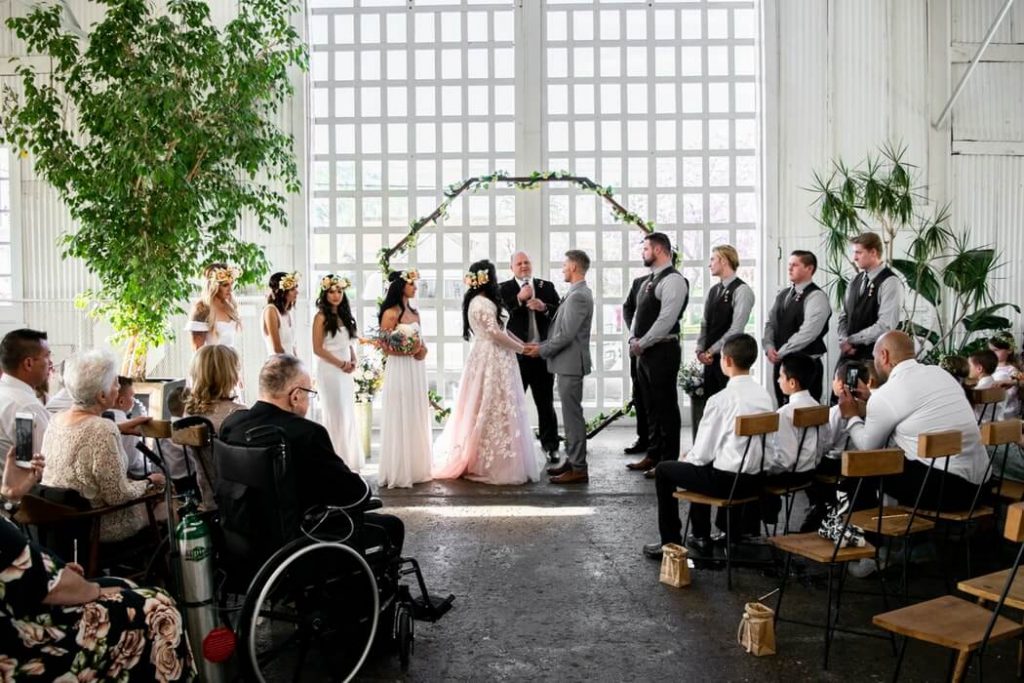As Wedding Know How editors, we write about things that we love and we think you'll like too. We have affiliate partnerships and sponsorship and may generate some revenue from these at no cost to you.
While most people think about the wedding reception, the wedding ceremony is what makes the union of two people symbolical and meaningful.
Most wedding ceremonies are rooted in tradition, with associated rituals to celebrate love and lifetime partnership. Since there are many ways to say “I do”, how do know what type of wedding ceremony will work best for you?
Let’s take a look at the types of wedding ceremonies.
What Is a Wedding Ceremony?

The ceremony is the meat and potatoes of a wedding, so to speak. It’s where the marriage vows, exchanging of wedding rings, pronouncement of marriage, and other rituals take place. A wedding ceremony isn’t just a formality, it makes your big day more memorable and meaningful.
Depending on the couple’s preferences, a wedding ceremony may have religious or legal significance, or it can simply be a symbolic union.
In the past, wedding ceremonies were typically structured and formal affairs. Today, they are still so but there are more ways to personalize the ceremony and make them more relaxed events.
Wedding Reception vs. Wedding Ceremony

A Fun and Casual Wedding Reception
A wedding reception is easier to personalize than the ceremony itself. It is the party held after a ceremony when you’re already pronounced husband and wife. A wedding reception isn’t a requirement, but it typically includes a meal to celebrate with your family, relatives, and friends, and like wedding ceremonies, there are different types of wedding receptions too.
Usually, a wedding cake is served, and wedding souvenirs are given to the guests. This is the part of the day where the newlyweds can have their first dance and mingle with their guests. The reception is the party, the ceremony contains the formalities.
Different Types of Wedding Ceremonies
The type of wedding ceremony you choose determines many of your later decisions—what rituals you include in your ceremony, where you exchange vows, and who officiates. Let’s take a look at the most popular types of ceremonies:
1- Religious Ceremony
Types of Religious Ceremonies
Religious ceremonies focus on uniting the couple while following the beliefs and traditions of a particular religion. If you’re a devoted follower of a certain faith or religion, you might want your church or congregation to recognize your marriage. Most church leaders and evangelists are licensed to officiate a wedding ceremony, but some require a civil ceremony before or after to make the marriage legal.
Most of the time, religious ceremonies have their own standards and processes based on their doctrines. If the ceremony takes place at a sacred place of worship, there are rules to be followed, and the options to personalize your wedding will be limited.
For example, if the ceremony is held at a church, customizing the space—wedding decorations, floral arrangements, motifs, and some elements—might be impossible.
Another option is to have a religious service held at nonreligious sites, where a religious leader incorporates the traditions, customs, and doctrine of your faith along with legal requirements for your wedding ceremony.
A side note is that most religions require the couple to attend some pre-wedding counselling before the wedding takes place.
2- Interfaith Ceremony

If you and your partner have different religions, an interfaith ceremony will allow you to incorporate both of your cultural and religious practices into your wedding.
This ceremony is the perfect option whether one of you plans to convert to the other soon or whether both of you want to keep your individual faiths. It’s an excellent way to symbolize unity and love, regardless of individual beliefs.
The ceremony will bond your union and allow you to receive blessings from parents and friends. Generally, an officiating minister will preside over the ceremony, considering both religious traditions and beliefs.
3- Civil Ceremony

When it comes to civil ceremony, your marriage is accordance with the law rather than faith, religion, or beliefs. Civil ceremony simply makes your marriage legal through pledging vows and signing marriage contract. Most of the time, it is presided over by a legal official like a judge, court clerk, or mayor, rather than a religious leader.
Typically, the ceremony is held in a city hall, courthouse, local registry, or any place that is appropriate for civil weddings. Civil ceremonies are plain and simple and involve little preparation and expense. However, this type of ceremony doesn’t have the usual wedding rituals—readings, music, writing your own vows and other forms of personalization.
Most of the time, the only people present on the ceremony are the couple, civil official, and legal witnesses. A great thing, the couple can opt for a simple or elaborate reception after their wedding ceremony.
4- Humanist Ceremony

One of the most popular types of non-religious wedding ceremonies, a humanist ceremony doesn’t include any religious references.
In fact, it is based on humanism, the belief that one can be great members of society by following strong moral codes, without adhering to certain religious beliefs. Generally, a humanist celebrant presides over the ceremony, but some couple can also opt for civil wedding with humanist celebrations.
A great thing about the humanist ceremony is that it focuses on the couple, making their wedding day more personalized and special. In fact, the ceremony allows the couple to incorporate rituals like writing their own vows, reciting poetry, and other symbolic activities, which reflect their thoughts and expresses their love for each other.
5- Non-Denominational Ceremony

If both of you have spiritual beliefs but don’t identify with any religion, a non-denominational ceremony is ideal for you.
The ceremony will still mention God and reflect spirituality without following certain religious doctrine and tradition. When it comes to this type of ceremony, the one who presides over the wedding should ideally be able to show a personal connection to the couple and their story.
Wedding rituals filled with symbolism are encouraged in this ceremony, but they should be understood by attendees for them to be more meaningful. Most of the time, non-denominational ceremonies let you have a peek into the couple’s world, not their culture or tradition. Marriage is a commitment, and this ceremony should maintain its sacred aspect.
6- Destination Wedding

Do you want your wedding to be a cultural experience? Some couples want to do something fun and unique on their wedding day, and destination weddings are the best. If you love traveling and dreamed of getting married in an exotic location, you may opt for a destination wedding. Just keep in mind that marriage license rules vary from country to country.
More than that, you must consider the size of your wedding, as the more guests you have, the more financial investment you’ll need. Going for a small guest list will let you focus on creating unique experience for each attendee. Still, the cost will depend on where the ceremony will be held and how elaborate the celebration is.
You might also think of a cruise wedding where the ship’s captain officiates the ceremony. However, this kind of wedding is intimate, and the attendees are typically fewer than 30 people. Some cruise ships can televise the special occasion for those who could not attend the wedding.
7- Same Sex Wedding

Laws are changing around the world, and same-sex marriages are now being recognized, as they should! Same-sex wedding allow couples to be legally married, giving legal rights, responsibilities and recognition to their relationship.
On the other hand, if you live in a country that doesn’t recognize same-sex marriages, you will require a civil union. You can have a commitment ceremony to make public proclamation of your union, resembling the traditional wedding ceremony.
Same-sex weddings can incorporate the traditional wedding customs, along with personalized rituals since you’re not bound by religious restrictions.
Which Type of Ceremony is Right for You?
Decide if religion, beliefs, and tradition will play a big role in your wedding.
If you want to include spiritual and religious aspects to your wedding, you might consider a religious ceremony, interfaith ceremony, or non-denominational ceremony.
If you both prefer something personal yet still want to include some aspects of your faith and traditions, you may be able to tweak the ceremony around a bit but like we’ve already discussed, these types of ceremonies are typically structured.
Having said that, religious weddings can be very special and meaningful to couples who find religion and spirituality the center of their lives.
If you’re wedding is more humanist in nature, then there’s more space for personalization and ways to make the ceremony truly meaningful and special.
How to Incorporate A Theme into A Wedding Ceremony

It is true that themed weddings add uniqueness and excitement to your big day, but some themes aren’t acceptable for certain types of ceremonies.
Religious ceremonies held at a place of worship might hinder you from customizing the venue especially if it is too whimsical or unconventional. In this case, it’s best to have the ceremony in your traditional style first, before plunging into the theme at the reception.
Know What You Want
Consider the following questions when deciding on the type of ceremony that best suits you:
- Will you be having a single venue for your ceremony and reception?
- Do you want to make your wedding ceremony to be casual?
- Does the idea of a structured, stiff ceremony make you break out in a sweat?
- Does something whimsy and romantic sound appealing?
- Does a non-traditional wedding ceremony venue make you smile?
- How do you feel about clifftop, beach, woodland, winery or barnyard venues?
Asking yourself this and other similar questions will help you to hone in on your ideal wedding ceremony.










